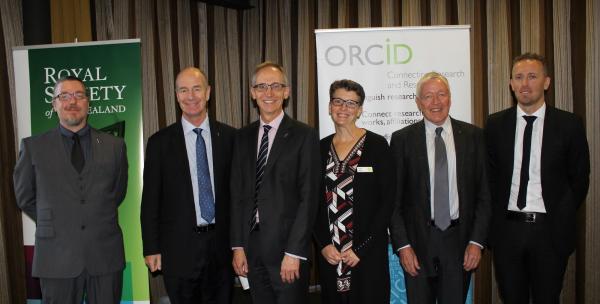News
Published 13 October 2016Closing the loop – New Zealand launch of ORCID iD as digital identifier for researchers
Today’s launch of the New Zealand ORCID Consortium will help close the loop on New Zealand’s research system, allowing for up-to-date records of researcher contributions and evaluation of the research system.
New Zealand will be the latest country to adopt a national approach to the Open Researcher and Contributor ID or ORCID platform.
ORCID is a global not-for-profit organisation created in 2012 to solve the problem of name ambiguity in research by creating a registry with a unique identifier for each researcher, like a national health number but for researchers.
Thousands of researchers in New Zealand have already registered for an ORCID iD so that their research contributions can always be correctly linked back to them. They will soon be able to have their funding, and their organisations, authoritatively added as well, thanks to the newly launched New Zealand ORCID Consortium.

ORCID New Zealand Consortia launch, from left: Jason Gush (RSNZ), Andrew Cleland (RSNZ), David Smol (MBIE), Laurel Haak (ORCID), Richard Bedford (RSNZ), Clinton Watson (MBIE)
“Researchers, research institutions, publishers and funding bodies routinely face the problem of accurately linking research publications, data and other research activities to the right researcher,” says Royal Society of New Zealand President Emeritus Professor Richard Bedford.
“The use of unique persistent identifiers allows research work to be correctly attributed to its creator, funding sources and also better connect to data systems, supporting best research practice.
“At present, it’s prohibitively expensive to be able answer a question such as ‘15-years on, what have the recipients of a particular scholarship or fund achieved?’. This is because it is very difficult to track down recipients and to see what research contributions they have made in the intervening time. A system like ORCID, once widely adopted, makes answering these sorts of questions routine. This data will support decisions on how to best support the research community in New Zealand.”
Researchers, who maintain control of what research contributions are recorded against their ID, benefit by being able to access an up-to-date record of all their research contributions, which they could then provide to journals or grant organisations, avoiding the need to re-enter information.
Ideally, all students embarking on research will be issued with an ORCID iD when they are first at a tertiary institution.
The Society has been tasked by the New Zealand Government to lead implementation of ORCID in New Zealand and is today holding a formal launch and workshop.
“We have been very pleased with the interest in this initiative. It shows that ORCID addresses a perceived need in the New Zealand research community and, as we seek to support best research practice in New Zealand, we are very pleased to take a leading role in implementing ORCID in New Zealand,” says Professor Bedford.
Earlier ten New Zealand organisations signed a joint statement of principle to use the ORCID platform and the Ministry of Business, Innovation and Employment has agreed to pay the consortium fee and meet within-country costs to allow eligible New Zealand organisations to join. This support covers the Society’s ORCID work programme, including consortium membership subscriptions for up to ninety-nine New Zealand organisations, and a software development work programme to create a New Zealand ORCID hub that will allow organisations of all scales and technical resource to productively engage with ORCID.
Today the Consortium has 34 founding members, with another 4 having stated their intention to join.
The founding members of New Zealand ORCID Consortium are: the Royal Society of New Zealand, Motu Economic & Public Policy Research Trust, Medical Research Institute of New Zealand, Titanium Industry Development Association, Auckland University of Technology, Leather and Shoe Research Association, Lincoln Agritech Ltd, Waiariki Bay of Plenty Polytechnic, Victoria University of Wellington, Waikato Institute of Technology, Aqualinc Research Ltd, Ministry of Education, University of Waikato, Ministry of Business Innovation and Employment, Universal College of Learning (UCoL), GNS Science, Auckland District Health Board, Cawthron Institute, Opus Research, University of Canterbury, CRL Energy Ltd, NIWA, University of Otago, Hutt Valley District Health Board, Ministry for Primary Industries, AgResearch, Landcare Research, the Tertiary Education Commission, Health Research Council of New Zealand. Lincoln University, The University of Auckland, Capital and Coast District Health Board, Waitemata District Health Board, and Ara Institute of Canterbury.
The following organisations have committed to join: Massey University, Plant & Food Research, and the Eastern Institute of Technology.
Dr Laurel L. Haak, Executive Director of ORCID, travelled to New Zealand for the launch and workshop. “Positioning identifiers, including ORCID, as a core component of the New Zealand research information strategy is an essential part of developing not only a system-wide but international approach to understanding the knowledge flows that underpin innovation.”
She says there will soon be 20 ORCID consortia around the world but New Zealand has brought together the most diverse range of organisations across all research disciplines to join the national consortia, including universities, polytechnics, private and crown research organisations, health boards, government and research funders. “New Zealand is therefore leading the way in creating an inclusive research and innovation ecosystem.”
About ORCID
ORCID is a non-profit helping create a world in which all who participate in research, scholarship and innovation are uniquely identified and connected to their contributions and affiliations, across disciplines, borders, and time. Visit orcid.org
